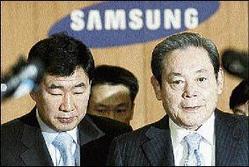
Samsung Group Chairman Lee Kun-hee (right) arrives to hold a press conference at the Samsung Group headquarters in Seoul, Tuesday.
AP:
Samsung Group Chairman Lee Kun-hee said Tuesday he was stepping down after 20 years as chief of South Korea's biggest conglomerate, quitting in the aftermath of his indictment on tax evasion and other charges last week.
The move, announced to reporters by Lee himself, was both welcomed as a possible sign of more openness at the troubled business group, but also as a cause for worry that Lee's absence may harm South Korea's economy.
The 66-year-old Lee, with about 30 Samsung executives standing nearby, apologised for "troubles to the nation" over an independent counsel investigation into the conglomerate's operations that resulted in the indictment of himself and other Samsung executives last week.
A loner
Until recent weeks, South Koreans were unaccustomed to hearing much publicly from Lee, who has been described as a loner with a fascination for gadgets and how they work.
During the independent counsel investigation, however, Lee spoke to reporters after undergoing hours of questioning twice in a week - and even hinted he might resign.
Lee took over the reins of Samsung two decades ago following the death of his father, the conglomerate's founder. He is one of South Korea's richest people, is widely regarded as its most influential business executive and serves on the International Olympic Committee.
Samsung Group has interests in dozens of businesses including electronics, shipbuilding and construction. Its companies account for up to 20 per cent of South Korea's exports, by some estimates.
Samsung Electronics Co, its flagship corporation, is a world leader in computer chips, flat-screen TVs and mobile phones.
Lee is widely seen as the driving force behind its rise into a global technology force.
Special prosecutors last Thursday indicted Lee on charges of evading 112.8 billion won (US$113 million; euro71 million) in taxes, ending a three-month probe in the family-run conglomerate prompted by allegations of wrongdoing by a former Samsung lawyer.
Claim dismissed
Prosecutors, however, dismissed the most explosive claim - that Samsung used affiliates to raise a slush fund to bribe influential South Koreans - for lack of evidence.
They also decided to indict Lee without arrest, saying his apprehension was too big a risk for South Korea, citing "the extremely competitive global economic situation."
Nine other Samsung executives were also indicted on various charges.

